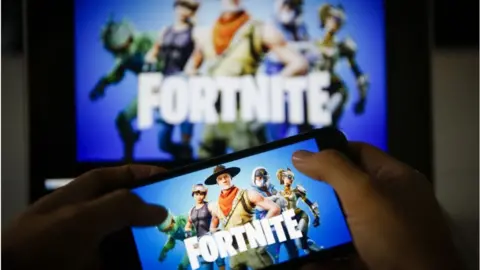Google loses monopoly case to Fortnite maker Epic Games
 Getty Images
Getty ImagesThe maker of popular video game Fortnite has won a US court battle against Google, with a jury deciding that the search giant had operated an illegal monopoly.
Epic Games sued Google in 2020, accusing it of unlawfully making its app store dominant over rivals.
Hundreds of millions of people use the store to install apps for smartphones powered by Google's Android software.
Google said it would challenge the outcome.
However Epic chief executive Tim Sweeney welcomed the verdict.
"Victory over Google! After four weeks of detailed court testimony, the California jury found against the Google Play monopoly on all counts," Mr Sweeney wrote in a post on X, formerly known as Twitter.
He said the court would start considering the issue of compensation in January.
The lawyers for the two companies made their final arguments on Monday in a trial that lasted more than a month.
Jurors unanimously found in favour of Epic on all counts.
Despite the legal defeat, Google is continuing to defend its business model.
"Android and Google Play provide more choice and openness than any other major mobile platform," Wilson White, vice-president of government affairs and public policy at Google, said.
"The trial made clear that we compete fiercely with Apple and its App Store, as well as app stores on Android devices and gaming consoles," he added.
"We will continue to defend the Android business model and remain deeply committed to our users, partners, and the broader Android ecosystem."
The case also challenged transaction fees of up to 30% that Google imposes on Android app developers, and how the tech giant ties together its Play Store and billing service, which means developers must use both to have their apps in the store.
The ruling therefore could give developers more agency over how their apps are distributed and how they make money from them.
Google maintains that its commissions are competitive for the industry, and that it provides added bonuses like reach, transaction security and protections against malware.
But, if the ruling stands, Google may have to allow more app stores onto Android-powered devices and will lose revenue it makes from any in-app purchases.
Epic has its own app store on PC, which offers its own products as well as third-party apps and games.
It is a competitor to Steam, one of the world's largest video game distribution platforms.
How big is Google's Play Store?
Google Play Store is one of the world's largest app stores and competes directly with Apple's App Store.
Android powers roughly 70% of smartphones globally, and according to Epic games, more than 95% of Android apps are distributed through the Play Store.
The store is not as profitable for the tech giant as its search business, but the platform gives Google access to billions of mobile phones and tablets.
Epic said in the lawsuit that Google "suppresses innovation and choice" through a "web of secretive, anti-competitive agreements".
"Over the course of the trial we saw evidence that Google was willing to pay billions of dollars to stifle alternative app stores by paying developers to abandon their own store efforts and direct distribution plans, and offering highly lucrative agreements with device manufacturers in exchange for excluding competing app stores," Epic games said in a statement after the verdict.
Google had countersued for damages against Epic for allegedly violating the company's developer agreement.
The tech giant has faced a number of anti-trust cases, settling similar claims from dating app Match before the Epic trial started.
Epic filed a similar antitrust case against Apple in 2020, but a US judge largely ruled in favour of Apple in 2021.
Epic challenged the decision in 2022.
"The evidence presented in this case demonstrates the urgent need for legislation and regulations that address Apple and Google strangleholds over smartphones," Epic Games said in its statement.
